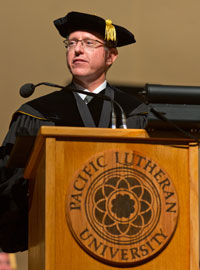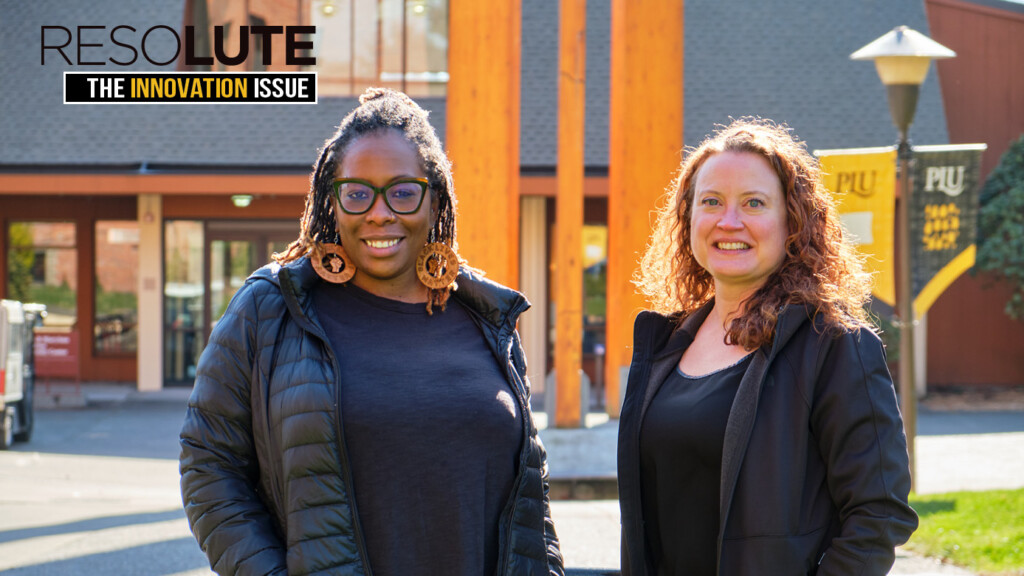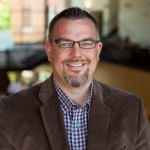Page 97 • (1,003 results in 0.083 seconds)
-

is the insistence that human beings are not called upon to escape this world, but rather to engage this world. The Wild Hope Center for Vocation at PLU takes its name from a poem called “The Summer Day” by the late Mary Oliver. In the piece, she poses the profound invocation: “Tell me, what is it you plan to do with your one wild and precious life?” In the Lutheran tradition, a life worth living is one that’s lived in service to others. To Sergia Hay, associate professor of philosophy and Fall
-
Jonathan Ryan will present an organ recital in Lagerquist Hall on Sunday, Oct. 9, at 3 p.m. The program will include selections from J.S. Bach’s Clavierübung III, sometimes referred to as The German Organ Mass, one of the many masterpieces by the most famous of Lutheran composers. From Bach’s title page: “The third Part of the Keyboard Practice, consists of various preludes on Martin Luther’s catechism and other hymns for the organ.” Ryan will also present a lecture/demonstration on the topic of
-

intellectual rigor as it was about religion. With his fellow reformer, Philip Melanchton, Luther established the German pattern of secondary and tertiary education upon which the American system was modeled in the later nineteenth century. Professor Luther’s Reform of both faith and education came about as a result of his asking troubling questions, for which he got into trouble. Luther and Melanchthon have shown us that colleges and universities are, and must remain, places to ask troubling questions, to
-

the ability to act with courage and care. As I serve as an educator committed to the philosophy that everyone can learn, unlearn, relearn—the ability to integrate the values of PLU’s mission into my meaning-making framework serves me each day. Brian Bannon ‘97: The environment wasn’t hostile in terms of being unsafe but it was definitely an environment where students were expressing their anti-gay views. It was also real opportunity for students and faculty to begin grappling those questions as a
-
and Jess Forever, and the remake of The Muppets. She went to Harvard, and although she was involved in acting and music, she majored in religion and philosophy. How did that happen? “I don’t know, I um. . .” she laughed. “I think that’s the whole point of a liberal arts education, is you study something that you would never get the opportunity to study that has nothing to do with what you actually end up doing in your real life.” Music Department Questions and AnswersHow do I get a music
-

: That makes a lot of sense. I think it depends on what this question is asking. It’s innovative because of the ways in which we have been taught to think in the systems we’ve built. And the systems are very cleverly hidden by white supremacy. Jen: Exactly. Here’s a great example: A philosophy faculty member gave a talk years ago on whether faucets are racist. He was looking at these automatic faucets that don’t pick up darker skin tones*. So a touchless faucet is an innovation, right? But it’s
-

global courses and projects, and in 2013 created an innovative new course in the PLU School of Business that allows students to earn internship credit and participate in a unique, global project. In this course, students experience and grow in the areas of community building and engagement, outreach and education (locally and globally), fundraising, crowdfunding, and international nonprofit projects. The course utilizes an interdisciplinary approach blending business, philosophy, Hispanic studies
-
graphic design, book arts, print making, and other forms of art making. Emily MetzlerThe Philosophy of a Flowers Life Faculty Mentor: Alex Krajkowski, Communication, Media & Design Arts This project will focus on cliche photos we see daily in the media, with a bit of a twist. I have taken some photos of flowers for a photography class that is not the typical photos that one would see on social media. I have taken four photos all representing a certain stage in the flowers' life. Adrienne SlawikMnemic
-
States,” Davidson said. Students in the cohorts claim a variety of backgrounds — with families from countries all over Central and South America, for example — and their majors are as diverse as they are: biology, education, philosophy, social work, kinesiology, and more. But Davidson said their shared experiences are key to creating the sense of community, a primary factor that has contributed to the cohorts’ near-perfect retention rate, despite the challenges first-generation students of color
-
in the M.A.E./Cert program. (6) EDUC 587 : History of Education A study of great men and women whose lives and writings have shaped and continue to shape the character of American education. (3) EDUC 588 : ST: Leadership in Higher Education Leadership development for administrators and faculty. Focus on higher education leadership models as they relate to PLU. Restricted to PLU administrators and faculty. (1 to 4) EDUC 589 : Philosophy of Education Philosophical and theoretical foundations of
Do you have any feedback for us? If so, feel free to use our Feedback Form.


